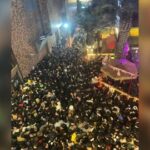
DUBAI, United Arab Emirates (AP) — Iranian students clashed with security forces at universities across Iran on Sunday, Iranian media reported, as videos showed security forces firing tear gas and live ammunition at students.
Sunday’s violence came as nationwide protests gripped the country despite threats from the country’s paramilitary Revolutionary Guard. The Guard’s chief had warned young Iranians that Saturday would be the last day of the protests first sparked by the Sept. 16 death of Mahsa Amini in the custody of the country’s morality police.
Clashes escalated at Azad University in Tehran, where Iran’s semiofficial Tasnim news agency reported that some groups attacked a protest staged during a memorial ceremony for the victims of a deadly attack at a major Shiite holy site in southern Iran. Several students were injured in the clashes, Tasnim reported, without elaborating.
Videos on social media purportedly showed security forces firing tear gas at students shouting against Supreme Leader Ayatollah Ali Khamenei. University campuses have emerged as central hotbeds of opposition, playing a central role in the protest movement.
A video posted by the Oslo-based group Iran Human Rights showed a member of the Basij, the Guard’s force of paramilitary volunteers, firing a pistol at close range at students protesting.
The human rights group said it strongly condemned, “the encroachment of university campuses by armed plainclothes forces and violent crackdown on peaceful student protests.”
Hardline, pro-government students in several universities across the country had gathered to commemorate a deadly Islamic State-claimed attack on a mosque in Shiraz that killed 13 people on Wednesday, including women and children. The ceremonies also drew masses of antigovernment protesters, including at Azad University.
“Freedom, freedom, freedom!” they chanted.
The Iranian government has repeatedly alleged that foreign powers have orchestrated the protests, without providing evidence. The protests have become one of the most serious threats to Iran’s ruling clerics since the 1979 Islamic Revolution.
The protests first focused on the state-mandated hijab, or headscarf, for women but quickly grew into calls for the downfall of Iran’s theocracy itself. At least 270 people have been killed and 14,000 have been arrested in the protests that have swept over 125 Iranian cities, according to the group Human Rights Activists in Iran.
Since October 24, the country’s authorities started hearing the cases of at least 900 protesters charged with “corruption on earth” — a term often used to describe attempts to overthrow the Iranian government that carries the death penalty.




